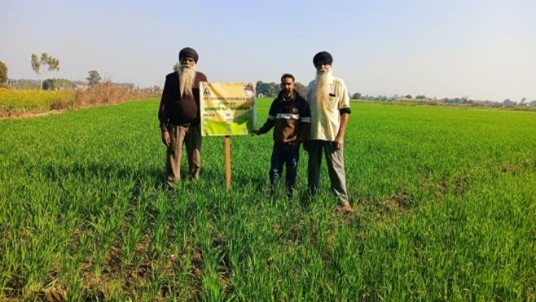The agricultural landscape is undergoing a transformative shift, as innovative solutions to sustainability and environmental challenges gain momentum. One such breakthrough is the shift towards sustainable farming practices that not only boost crop yields but also reduce environmental harm. ITC’s Crop Residue Management initiative is playing a pivotal role in this transformation across Punjab, Haryana, and Western Uttar Pradesh. By introducing sustainable agri practices, ITC is empowering farmers to adopt methods that enhance productivity, safeguard the environment, and improve their economic well-being.
In the past, farmers across different regions often resorted to stubble burning as the quickest and easiest solution to clear their fields. This practice, though common, led to significant environmental and health concerns, contributing to air pollution and soil degradation.
ITC’s integrated Crop Residue Management initiative is helping shift this mindset and practice. The initiative, which covers over 2.5 lakh acres in Kapurthala District, has led to over 94% of farms adopting stubble-burning-free cultivation. Through its integrated social investment programme, ITC promotes sustainable agricultural practices by providing farmers with innovative machinery, training, and technical support, empowering them to enhance productivity while safeguarding the environment. ITC aims to scale its success, expanding from a few villages to 688 villages and nearly 3 lakh acres by 2024.
Jaswinder, a farmer from Bhullarai village, reflects on this transition: “In the past, we burned stubble because it was the quickest solution. But today, I see the difference in my yield, my cost savings, and the cleaner environment around me. This is the future of farming.”
Jaswinder had practiced conventional farming for 15 years. With the help of ITC, he adopted sustainable agricultural practices, including crop residue management (CRM), Direct Seeded Rice (DSR), Alternate Wetting and Drying (AWD ) for paddy, and the Happy Seeder for wheat. This reduced his cultivation costs by 9% for paddy and 27% for wheat. He also planted 250 plantation trees for fibre, earning Rs. 6,000 annually and improving soil health. “These practices have enhanced my productivity and ensured sustainability,” he shares.
Nachattar Singh, a farmer from Khukrain village in Punjab, faced rising input costs, poor soil health, and stubble burning. After joining ITC’s Mission Sunehra Kal programme in 2020, he adopted the Happy Seeder and Super Seeder technologies. His wheat yield increased from 19 to 21 quintals per acre, while cultivation costs dropped 27%. More importantly, Nachattar stopped burning stubble, benefiting both the environment and his farm’s financial health. “By adopting these technologies, I am not only increasing my profits but also contributing to a cleaner environment,” he says.
Mota Singh, from Kanjli village, struggled with water stagnation affecting his wheat yield. In 2022, he adopted residue management practices and built a rainwater pond, improving groundwater recharge and soil quality. Using the Super Seeder, he incorporated stubble instead of burning, while increasing his wheat yield by 28.57%, from 14 to 18 quintals per acre. “The improvements are astounding,” Mota says.
The rice-wheat system in these regions traditionally produces 3 tons of paddy stubble per acre. While burning stubble was a common practice, it caused significant environmental harm. Now, farmers like Jaswinder, Nachattar and Mota Singh are improving yields and reducing their environmental impact.
The practical solutions introduced by ITC have directly addressed the concerns of farmers:
- Technologies: Machines like the Happy Seeder, Super Seeder, and Rotavator enable farmers to sow wheat directly into paddy stubble, improving soil health and reducing the need for fertilizers. The Super Stubble Management System (SMS) pulverizes stubble, enabling wheat sowing without ploughing.
- In-situ incorporation measures or method of conservation in natural ecosystem: Techniques such as Direct Seeding of Rice (DSR), Zero Tillage Wheat, and Happy Seeder for wheat are helping conserve water, lower cultivation costs, and promote early crop maturity, giving farmers a longer window between rice harvest and wheat sowing.
- Ex-situ measures or method of conservation in man-made habitats: ITC fosters rural entrepreneurship by supporting farmers to collect and repurpose stubble into biomass energy and fodder, creating additional income streams. The percentage of ex-situ management of stubble, such as raking and baling, has increased from 12% to 24%, opening up markets for energy generation, briquette making, and fodder.
ITC has adopted a partnership model to enhance efficiency, scale and impact of the initiative. Through partnerships with organizations like IIT Delhi’s Arun Duggal Centre for Research in Climate Change and Air Pollution (CERCA), and NGO partner Manav Vikas Sansthan as the implementation partner, ITC is developing satellite-based monitoring tools to track stubble burning and improve the implementation of sustainable practices.
The programme’s impact is far reaching: farmers covered under the programme are significantly contributing to reducing CO2 emissions, conserving water, and improving farm profitability. Farmers across Kapurthala District have collectively reduced water usage by up to 25% in their cultivation cycles, making strides in both economic and environmental sustainability.
For farmers like Nachattar, Jaswinder, and Mota Singh, stubble burning initiative has revolutionised farming, enhancing productivity, profitability, and sustainability. “The future of farming is about sustainability for our children and grandchildren,” says Mota Singh. By equipping farmers with the knowledge and tools they need, ITC is ensuring a thriving future for agriculture and the environment.

